book store
Discover the best books as recommended by WIT!
WIT Recommendations

Empowered: Frame Your Narrative. Own Your Power.
Through our challenges, we all need a reminder that our stories can empower our journeys!
Serena Sacks-Mandel built a successful tech career on the foundation of a tough childhood. Brick by brick, she laid a new foundation for herself, one where she saw each of her successes as evidence that she could do more.
A huge part of her self-empowerment came from framing her own narrative-her personal story-in a way that each roadblock became a lesson, something she overcame.
If Serena’s story teaches us anything, it’s that we can change how we view our personal challenges to lead us to bigger and better things than we ever dreamed of!
If you’ve always been an outlier, a trail-blazer, a mover and shaker-or want to be-then you’ll love the inspiration you get from Serena’s story. From unwanted child to solo woman in a board room full of men to cancer survivor, Serena has stretched for the next level every step of the way and routinely reached it through perseverance, education, resilience, and an eagle eye on her purpose.
When you control your narrative, you can only keep climbing higher
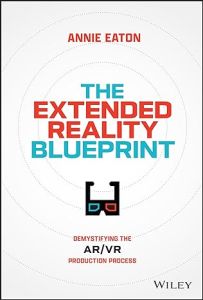
The Extended Reality Blueprint: Demystifying the AR/VR Production Process
The Extended Reality Blueprint focuses on design for non-gaming or gaming adjacent applications in extended reality (XR), including augmented and virtual reality. Author Annie Eaton is a leading producer of immersive content in the XR space. Many of Annie’s clients come to her with the same questions, often not knowing where to begin as they seek to implement extended reality solutions into their business. This book presents the discovery and product development process through an immersive technology lens. You will walk through the XR production process and learn how to apply this technology directly within your organizations in a meaningful and effective way. Join leading businesses like Delta Air Lines, Mars Wrigley, Georgia-Pacific, and JLG Industries, and learn how top companies are leveraging XR for greater market share, engagement, and profit.
- Learn about the latest applications of extended reality (XR), including augmented and virtual reality.
- Discover the steps of the XR product development process, including how to find profitable uses of XR and decide on technology suites.
- Assemble effective teams of XR developers, designers, artists, and other key members to bring your projects to fruition and success.
- Learn from the real-world examples and lessons learned of businesses that have taken the leap into extended reality.
The Extended Reality Blueprint, delivers a concrete, actionable process for bringing extended reality into your organization and embracing this crucial technology to remain current.
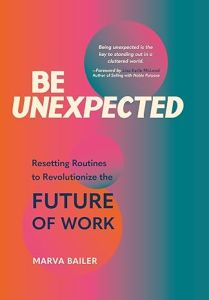
Be Unexpected: Resetting Routines to Revolutionize the Future of Work
2023 National Indie Excellence Award Winner, Career Category
One of Scarlett Abbott’s 2023 World Changers, Marva Bailer takes a modern twist on business protocols that haven’t changed since the eighties in her book, Be Unexpected. Energizing the routine and mundane professional lectures and meetings, Be Unexpected will teach readers soft skills in a relatable way that will help create positive connections.
“Some people are just natural connectors, but she might as well be Master Connector of the Universe. Listen to her philosophy of connecting people and giving back. It’s astonishing.” -Stu Heinecke Author, How to Get a Meeting with Anyone”Smoochin'” by Mark Knopfler
“I highly recommend Be Unexpected to anyone wanting an advantage in business from one of the hardest working, truly sincere executives in our country and across the planet.” -Ricky Steele Author of The Heart of Networking “Man in the Mirror” by Michael Jackson
“Be Unexpected is a fun read that is full of creative ways to improve personal influence and enjoyment. Marva is a master at connecting with others, and her book shows us why.” -Russ Rausch CEO and Cofounder, Vision Pursue, LLC, Performance Mindset “Twice as Hard” by The Black Crowes
“Marva Bailer makes the art of storytelling as approachable and engaging as she is, delivering in Be Unexpected a creative collection of real world-tested, specific strategies for communicating with each other in today’s post-pandemic, virtual-meeting world.” -Maryfran Johnson CEO, Maryfran Johnson Media “Beautiful Day” by U2
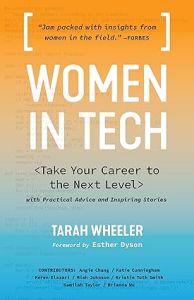
Women in Tech: Practical Advice and Inspiring Stories from Successful Women in Tech to Take Your Career to the Next Level
As the CEO of a startup, Tarah Wheeler is all too familiar with the challenges female tech professionals face on a daily basis. That’s why she’s teamed up with other high-achieving women within the field—from entrepreneurs and analysts to elite hackers and gamers—to provide a roadmap for women looking to jump-start, or further develop, their tech career.
In an effort to dismantle the unconscious social bias against women in the industry, Wheeler interviews professionals like Brianna Wu (founder, Giant Spacekat), Angie Chang (founder, Women 2.0), Keren Elazari (TED speaker and cybersecurity expert), Katie Cunningham (Python educator and developer), and Miah Johnson (senior systems administrator) about the obstacles they have overcome to do what they love. Their inspiring personal stories are interspersed with tech-focused career advice. Readers will learn:
• The secrets of salary negotiation
• The best format for tech resumes
• How to ace a tech interview
• The perks of both contracting (W-9) and salaried full-time work
• The secrets of mentorship
• How to start your own company
• And much more!
BONUS CONTENT: Perfect for its audience of hackers and coders, Women in Tech also contains puzzles and codes throughout—created by Mike Selinker (Lone Shark Games), Gabby Weidling (Lone Shark Games), and cryptographer Ryan “LostboY” Clarke—that are love letters to women in the industry. A distinguished anonymous contributor created the Python code for the cover of the book, which references the mother of computer science, Ada Lovelace. Run the code to see what it does!
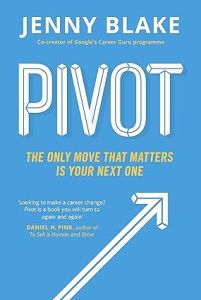
Pivot: The Only Move That Matters Is Your Next One
In today’s economy the average job tenure is only four years, and falling. Roles change constantly. Even smart, motivated people hit professional plateaus.
‘What’s next?’ is a question we all have to answer more frequently. But how do you advance without getting stuck?
In Pivot, Jenny Blake, co-creator of Google’s Career Guru Programme, shows you how to build upon your assets – your strengths, interests and networks – to launch a new career with meaning and adventure. You will learn how to redirect your energy, scan for opportunities and identify new skills without falling prey to ‘analysis paralysis’ or ‘compare and despair’.
No matter your age, industry, or bank balance, pivoting is the crucial skill you need to stay agile and keep you moving forward.
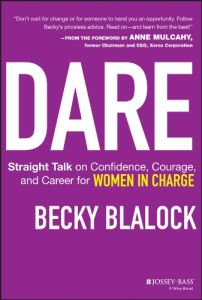
Dare: Straight Talk on Confidence, Courage, and Career for Women in Charge
Though women hold a majority of the managerial and professional jobs in the workforce, they occupy a mere 14% of C-suite positions at Fortune 500 firms. To break through this stubborn glass ceiling, women must learn to take bold steps when career-defining moments arise. During her 33-year career at Southern Company, a Fortune 500 utility company, Becky Blalock rose to become CIO in a traditionally male industry. Now she offers her own hard-won advice, as well as that of 28 top female executives, to show all aspiring women how to dare to reach the highest tier of leadership and C-suite positions.
- Includes advice and mentoring lessons from top women business leaders such as: Anna Maria Chávez, CEO of the Girl Scouts of the USA; Kat Cole, President of Cinnabon; Carol Tomé, CFO of Home Depot; Dr. Beverly Tatum, president of Spelman College, and Jeanette Horan, CIO of IBM, among many others
- Features straightforward, honest advice on gaining confidence, speaking up, finding mentors, learning to fail, building a network of allies, managing others, and more
- Written by pioneering business leader Becky Blalock, with a Foreword by Anne Mulcahy, former chairperson and CEO of Xerox Corporation
Dare is must-needed guide for women everywhere, at every level, striving to develop the character, skills, and relationships that deliver greater success in the workplace.
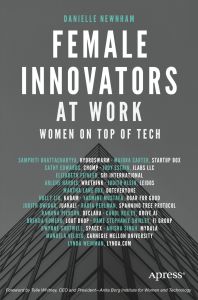
Female Innovators at Work: Women on Top of Tech
This book describes the experiences and successes of female innovators and entrepreneurs in the still largely male-dominated tech-world in twenty candid interviews. It highlights the varied life and career stories that lead these women to the top positions in the technology industry that they are in now.
Interviewees include CEOs, founders, and inventors from a wide spectrum of tech organizations across sectors as varied as mobile technology, e-commerce, online education, and video games. Interviewer Danielle Newnham, a mobile startup and e-commerce entrepreneur herself as well as an online community organizer, presents the insights, instructive anecdotes, and advice shared with her in the interviews, including stories about raising capital for one’s start-up, and about the obstacles these women encountered and how they overcame them.
This timely book will be of great interest to anyone working in tech or looking to get into the industry, and more in general: to everyone wanting to learn how they can contribute to leveling the field of occupational opportunity and to strengthening teams and companies through merit and diversity.
WIT Board Member Recommendation: Christina Setzer-Poole
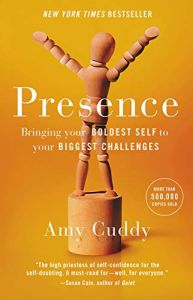
Presence: Bringing Your Boldest Self to Your Biggest Challenges
Have you ever left a nerve-racking challenge and immediately wished for a do over? Maybe after a job interview, a performance, or a difficult conversation? The very moments that require us to be genuine and commanding can instead cause us to feel phony and powerless. Too often we approach our lives’ biggest hurdles with dread, execute them with anxiety, and leave them with regret.
By accessing our personal power, we can achieve “presence”, the state in which we stop worrying about the impression we’re making on others and instead adjust the impression we’ve been making on ourselves. As Harvard professor Amy Cuddy’s revolutionary book reveals, we don’t need to embark on a grand spiritual quest or complete an inner transformation to harness the power of presence. Instead, we need to nudge ourselves, moment by moment, by tweaking our body language, behavior, and mind-set in our day-to-day lives.
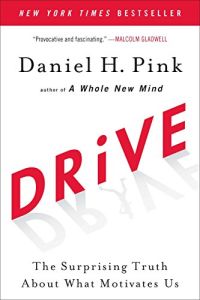
Drive: The Surprising Truth About What Motivates Us
Most people believe that the best way to motivate is with rewards like money—the carrot-and-stick approach. That’s a mistake, says Daniel H. Pink (author of To Sell Is Human: The Surprising Truth About Motivating Others). In this provocative and persuasive new book, he asserts that the secret to high performance and satisfaction-at work, at school, and at home—is the deeply human need to direct our own lives, to learn and create new things, and to do better by ourselves and our world.
Drawing on four decades of scientific research on human motivation, Pink exposes the mismatch between what science knows and what business does—and how that affects every aspect of life. He examines the three elements of true motivation—autonomy, mastery, and purpose-and offers smart and surprising techniques for putting these into action in a unique book that will change how we think and transform how we live
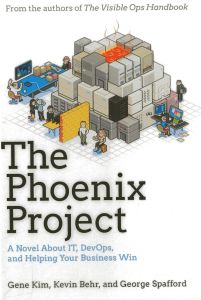
The Phoenix Project: A Novel about IT, DevOps, and Helping Your Business Win
Bill is an IT manager at Parts Unlimited. It’s Tuesday morning and on his drive into the office, Bill gets a call from the CEO.
The company’s new IT initiative, code named Phoenix Project, is critical to the future of Parts Unlimited, but the project is massively over budget and very late. The CEO wants Bill to report directly to him and fix the mess in ninety days or else Bill’s entire department will be outsourced.
With the help of a prospective board member and his mysterious philosophy of The Three Ways, Bill starts to see that IT work has more in common with manufacturing plant work than he ever imagined. With the clock ticking, Bill must organize work flow streamline interdepartmental communications, and effectively serve the other business functions at Parts Unlimited.
In a fast-paced and entertaining style, three luminaries of the DevOps movement deliver a story that anyone who works in IT will recognize. Readers will not only learn how to improve their own IT organizations, they’ll never view IT the same way again.
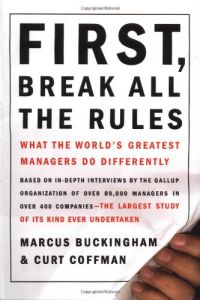
First, Break All the Rules: What the World’s Greatest Managers Do Differently
Gallup presents the remarkable findings of its revolutionary study of more than 80,000 managers in First, Break All the Rules, revealing what the world’s greatest managers do differently. With vital performance and career lessons and ideas for how to apply them, it is a must-read for managers at every level.
Included with this re-release of First, Break All the Rules: updated meta-analytic research and access to the Clifton StrengthsFinder assessment, which reveals people’s top themes of talent, and to Gallup’s Q12 employee engagement survey, the most effective measure of employee engagement and its impact on business outcomes.
What separates the greatest managers from all the rest?
WIT Advisory Council Member Recommendation: Dewayne Griffin
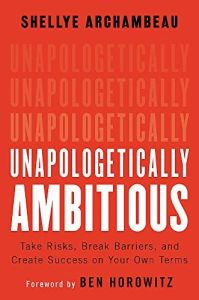
Unapologetically Ambitious: Take Risks, Break Barriers, and Create Success on Your Own Terms
Shellye Archambeau recounts how she overcame the challenges she faced as a young black woman, wife, and mother, managing her personal and professional responsibilities while climbing the ranks at IBM and subsequently in her roles as CEO. Through the busts and booms of Silicon Valley in the early 2000s, this bold and inspiring book details the risks she took and the strategies she engaged to steer her family, her career, and her company MetricStream toward success.
Through her journey, Shellye discovered that ambition alone is not enough to achieve success. Here, she shares the practical strategies, tools, and approaches readers can employ right now, including concrete steps to most effectively:
- Dismantle impostor syndrome
- Capitalize on the power of planning
- Take risks
- Developing financial literacy
- Build your network
- Establish your reputation
- Take charge of your career
- Integrate work, marriage, parenthood, and self-care
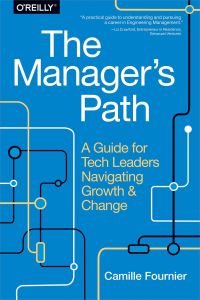
The Manager’s Path: A Guide for Tech Leaders Navigating Growth and Change
Managing people is difficult wherever you work. But in the tech industry, where management is also a technical discipline, the learning curve can be brutal—especially when there are few tools, texts, and frameworks to help you. In this practical guide, author Camille Fournier (tech lead turned CTO) takes you through each stage in the journey from engineer to technical manager.
From mentoring interns to working with senior staff, you’ll get actionable advice for approaching various obstacles in your path. This book is ideal whether you’re a New manager, a mentor, or a more experienced leader looking for fresh advice. Pick up this book and learn how to become a better manager and leader in your organization.
- Begin by exploring what you expect from a manager
- Understand what it takes to be a good mentor, and a good tech lead
- Learn how to manage individual members while remaining focused on the entire team
- Understand how to manage yourself and avoid common pitfalls that challenge many leaders
- Manage multiple teams and learn how to manage managers
- Learn how to build and bootstrap a unifying culture in teams.

Only One: How to Be a Bad Ass Boss in Corporate America
Monica M. Brown’s, Only One is the no-nonsense guide women need right now to help them climb the corporate ladder from recruit to senior executive positions within major industries around the world.
Bringing more than twenty years of experience in corporate America, with positions at instantly recognizable Fortune 500 companies, Monica details her journey from her journalism aspirations to finding her corporate calling.
This book is a mindset shift to help women in corporate climates navigate a myriad of potentially problematic scenarios, with sage advice, specific strategies, and proven resolutions. From code-switching to avoiding social media pitfalls, Monica explains what it takes to get to the top of the ladder and stay there.
And now she’s trying to bring other women with her.
With frankness and candor, Monica offers women in the workplace strategic steps to take control of their career, navigate race and gender biases in corporate America, and successfully climb the rungs to the executive level and beyond, so that she’s not the Only One.

Playing Big: Find Your Voice, Your Mission, Your Message
A groundbreaking women’s leadership expert and popular conference speaker gives women the practical skills to voice and implement the changes they want to see – in themselves and in the world.
In her coaching and programs for women, Tara Mohr saw how women were “playing small” in their lives and careers, were frustrated by it, and wanted to “play bigger”. She has devised a proven way for them to achieve their dreams by playing big from the inside out. Mohr’s work helping women play bigger has earned acclaim from the likes of Maria Shriver and Jillian Michaels, and has been featured on the Today show, CNN, and a host of other media outlets.
Sheryl Sandberg’s Lean In gave many women new awareness about what kinds of changes they need to make to become more successful; yet most women need help implementing them. In the tradition of Brené Brown’s Daring Greatly, Playing Big provides real, practical tools to help women quiet self-doubt, identify their callings, “unhook” from praise and criticism, unlearn counterproductive good girl habits, and begin taking bold action.
While not all women aspire to end up in the corner office, every woman aspires to something. Playing Big fills a major gap among women’s career books; it isn’t just for corporate women. The audiobook offers tools to help every woman play bigger – whether she’s an executive, community volunteer, artist, or stay-at-home mom.
Thousands of women across the country have been transformed by Mohr’s program, and now this book makes the ideas and practices available to everyone who is ready to play big.
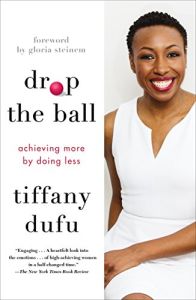
Drop the Ball: Achieving More by Doing Less
A bold and inspiring memoir and manifesto from a renowned voice in the women’s leadership movement who shows women how to cultivate the single skill they really need in order to thrive: the ability to let go.
Once the poster girl for doing it all, after she had her first child, Tiffany Dufu struggled to accomplish everything she thought she needed to in order to succeed. Like so many driven and talented women who have been brought up to believe that to have it all they must do it all, Dufu began to feel that achieving her career and personal goals was an impossibility. Eventually she discovered the solution: letting go. In Drop the Ball, Dufu recounts how she learned to reevaluate expectations, shrink her to-do list, and meaningfully engage the assistance of others – freeing the space she needed to flourish at work and to develop deeper, more meaningful relationships at home.
Even though women are half the workforce, they still represent only 18 percent of the highest level leaders. The reasons are obvious: Just as women reach middle management, they are also starting families. Mounting responsibilities at work and home leave them with no bandwidth to do what will most lead to their success. Offering new perspective on why the women’s leadership movement has stalled, and packed with actionable advice, Tiffany Dufu’s Drop the Ball urges women to embrace imperfection and to expect less of themselves and more from others – only then can they focus on what they truly care about, devote the necessary energy to achieving their real goals, and create the type of rich, rewarding life we all desire.

The Memo: What Women of Color Need to Know to Secure a Seat at the Table
From microaggressions to the wage gap, The Memo empowers women of color with actionable advice on challenges and offers a clear path to success.
Most business books provide a one-size-fits-all approach to career advice that overlooks the unique barriers that women of color face. In The Memo, Minda Harts offers a much-needed career guide tailored specifically for women of color.
Drawing on knowledge gained from her past career as a fundraising consultant to top colleges across the country, Harts now brings her powerhouse entrepreneurial experience as CEO of The Memo to the page. With wit and candor, she acknowledges “ugly truths” that keep women of color from having a seat at the table in corporate America. Providing straight talk on how to navigate networking, office politics, and money, while showing how to make real change to the system, The Memo offers support and long-overdue advice on how women of color can succeed in their careers.
WIT Board Member Recommendation:
Betsy Robinson
WIT Advisory Council Member Recommendation: Wendy Frazier
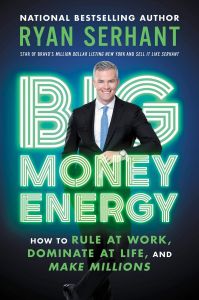
Big Money Energy: How to Rule at Work, Dominate at Life, and Make Millions
Big Money Energy is the feeling you get when you encounter someone who is massively succeeding at life. They’re the ultimate picture of self-confidence. There’s no bravado, no bragging—they know they have BME and so does everyone else. You get Big Money Energy by being 100% committed to making your vision a reality . . . and that vision has to be BIG.
Ten years ago, Ryan Serhant, billion dollar broker and costar of Million Dollar Listing New York was living paycheck-to-paycheck and didn’t even own a suit. Serhant realized that while he couldn’t change his circumstances or the balance of his bank account, there was one thing he could change—his energy. The energy you give off impacts every area of your life, from how much money you earn and how much power you have, to who you socialize with and the jobs you get.
Determined to leave his low-rent lifestyle behind forever, Serhant took life-changing steps that resulted in his getting cast on television, graduating to seven-figure sales, and doubling his income every year for the next decade. Serhant is now the CEO and Founder of SERHANT., a multi-dimensional real estate brokerage and media company, and averages a billion dollars in sales every year.
In Big Money Energy, Serhant will show readers how he tapped into his Big Money Energy to crush his goals and achieve huge success, earning his first million before he turned thirty. Whether you’re a self-made entrepreneur, a corporate executive or barista, Serhant will teach you how to climb the ladder to success better and faster than anyone else.
If you want Big Money Energy, this is your blueprint. This book is an inspirational, lively guide for anyone who is ambitious enough to dream big and is committed to doing whatever it takes to conquer them.
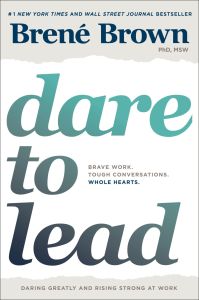
Dare to Lead: Brave Work. Tough Conversations. Whole Hearts.
Leadership is not about titles, status, and wielding power. A leader is anyone who takes responsibility for recognizing the potential in people and ideas, and has the courage to develop that potential.
When we dare to lead, we don’t pretend to have the right answers; we stay curious and ask the right questions. We don’t see power as finite and hoard it; we know that power becomes infinite when we share it with others. We don’t avoid difficult conversations and situations; we lean into vulnerability when it’s necessary to do good work.
But daring leadership in a culture defined by scarcity, fear, and uncertainty requires skill-building around traits that are deeply and uniquely human. The irony is that we’re choosing not to invest in developing the hearts and minds of leaders at the exact same time as we’re scrambling to figure out what we have to offer that machines and AI can’t do better and faster. What can we do better? Empathy, connection, and courage, to start.
WIT Board Member Recommendation: Cecilia Mao
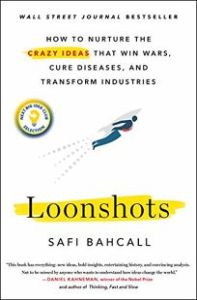
Loonshots: How to Nurture the Crazy Ideas That Win Wars, Cure Diseases, and Transform Industries
Why do good teams kill great ideas?
Loonshots reveals a surprising new way of thinking about the mysteries of group behavior that challenges everything we thought we knew about nurturing radical breakthroughs.
Bahcall, a physicist and entrepreneur, shows why teams, companies, or any group with a mission will suddenly change from embracing new ideas to rejecting them, just as flowing water will suddenly change into brittle ice. Mountains of print have been written about culture. Loonshots identifies the small shifts in structure that control this transition, the same way that temperature controls the change from water to ice.
Using examples that range from the spread of fires in forests to the hunt for terrorists online, and stories of thieves and geniuses and kings, Bahcall shows how a new kind of science can help us become the initiators, rather than the victims, of innovative surprise.
Over the past decade, researchers have been applying the tools and techniques of this new science―the science of phase transitions―to understand how birds flock, fish swim, brains work, people vote, diseases erupt, and ecosystems collapse. Loonshots is the first to apply this science to the spread of breakthrough ideas. Bahcall distills these insights into practical lessons creatives, entrepreneurs, and visionaries can use to change our world.
Along the way, readers will learn how chickens saved millions of lives, what James Bond and Lipitor have in common, what the movie Imitation Game got wrong about WWII, and what really killed Pan Am, Polaroid, and the Qing Dynasty.
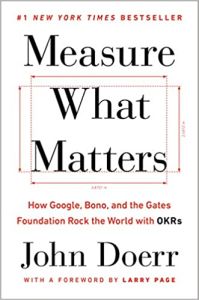
Measure What Matters: How Google, Bono, and the Gates Foundation Rock the World with OKRs
In the fall of 1999, John Doerr met with the founders of a start-up whom he’d just given $12.5 million, the biggest investment of his career. Larry Page and Sergey Brin had amazing technology, entrepreneurial energy, and sky-high ambitions, but no real business plan. For Google to change the world (or even to survive), Page and Brin had to learn how to make tough choices on priorities while keeping their team on track. They’d have to know when to pull the plug on losing propositions, to fail fast. And they needed timely, relevant data to track their progress—to measure what mattered.
Doerr taught them about a proven approach to operating excellence: Objectives and Key Results. He had first discovered OKRs in the 1970s as an engineer at Intel, where the legendary Andy Grove (“the greatest manager of his or any era”) drove the best-run company Doerr had ever seen. Later, as a venture capitalist, Doerr shared Grove’s brainchild with more than fifty companies. Wherever the process was faithfully practiced, it worked.
In this goal-setting system, objectives define what we seek to achieve; key results are how those top-priority goals will be attained with specific, measurable actions within a set time frame. Everyone’s goals, from entry level to CEO, are transparent to the entire organization.
The benefits are profound. OKRs surface an organization’s most important work. They focus effort and foster coordination. They keep employees on track. They link objectives across silos to unify and strengthen the entire company. Along the way, OKRs enhance workplace satisfaction and boost retention.
In Measure What Matters, Doerr shares a broad range of first-person, behind-the-scenes case studies, with narrators including Bono and Bill Gates, to demonstrate the focus, agility, and explosive growth that OKRs have spurred at so many great organizations. This book will help a new generation of leaders capture the same magic.
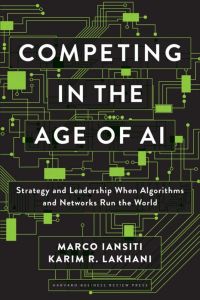
Competing in the Age of AI: Strategy and Leadership When Algorithms and Networks Run the World
AI-centric organizations exhibit a new operating architecture, redefining how they create, capture, share, and deliver value.
Marco Iansiti and Karim R. Lakhani show how reinventing the firm around data, analytics, and AI removes traditional constraints on scale, scope, and learning that have restricted business growth for hundreds of years. From Airbnb to Ant Financial, Microsoft to Amazon, research shows how AI-driven processes are vastly more scalable than traditional processes, allow massive scope increase, enabling companies to straddle industry boundaries, and create powerful opportunities for learning–to drive ever more accurate, complex, and sophisticated predictions.
When traditional operating constraints are removed, strategy becomes a whole new game, one whose rules and likely outcomes this book will make clear. Iansiti and Lakhani:
- Present a framework for rethinking business and operating models
- Explain how “collisions” between AI-driven/digital and traditional/analog firms are reshaping competition, altering the structure of our economy, and forcing traditional companies to rearchitect their operating models
- Explain the opportunities and risks created by digital firms
- Describe the new challenges and responsibilities for the leaders of both digital and traditional firms
Packed with examples–including many from the most powerful and innovative global, AI-driven competitors–and based on research in hundreds of firms across many sectors, this is your essential guide for rethinking how your firm competes and operates in the era of AI.
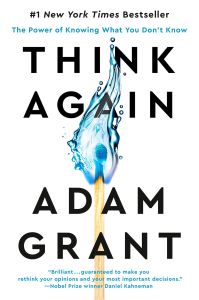
Think Again: The Power of Knowing What You Don’t Know
Intelligence is usually seen as the ability to think and learn, but in a rapidly changing world, there’s another set of cognitive skills that might matter more: the ability to rethink and unlearn. In our daily lives, too many of us favor the comfort of conviction over the discomfort of doubt. We listen to opinions that make us feel good, instead of ideas that make us think hard. We see disagreement as a threat to our egos, rather than an opportunity to learn. We surround ourselves with people who agree with our conclusions, when we should be gravitating toward those who challenge our thought process. The result is that our beliefs get brittle long before our bones. We think too much like preachers defending our sacred beliefs, prosecutors proving the other side wrong, and politicians campaigning for approval–and too little like scientists searching for truth. Intelligence is no cure, and it can even be a curse: being good at thinking can make us worse at rethinking. The brighter we are, the blinder to our own limitations we can become.
Organizational psychologist Adam Grant is an expert on opening other people’s minds–and our own. As Wharton’s top-rated professor and the bestselling author of Originals and Give and Take, he makes it one of his guiding principles to argue like he’s right but listen like he’s wrong. With bold ideas and rigorous evidence, he investigates how we can embrace the joy of being wrong, bring nuance to charged conversations, and build schools, workplaces, and communities of lifelong learners. You’ll learn how an international debate champion wins arguments, a Black musician persuades white supremacists to abandon hate, a vaccine whisperer convinces concerned parents to immunize their children, and Adam has coaxed Yankees fans to root for the Red Sox. Think Again reveals that we don’t have to believe everything we think or internalize everything we feel. It’s an invitation to let go of views that are no longer serving us well and prize mental flexibility over foolish consistency. If knowledge is power, knowing what we don’t know is wisdom.
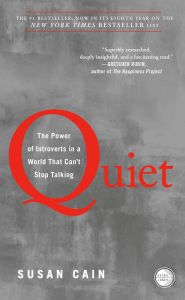
Quiet: The Power of Introverts in a World That Can’t Stop Talking
At least one-third of the people we know are introverts. They are the ones who prefer listening to speaking; who innovate and create but dislike self-promotion; who favor working on their own over working in teams. It is to introverts—Rosa Parks, Chopin, Dr. Seuss, Steve Wozniak—that we owe many of the great contributions to society.
In Quiet, Susan Cain argues that we dramatically undervalue introverts and shows how much we lose in doing so. She charts the rise of the Extrovert Ideal throughout the twentieth century and explores how deeply it has come to permeate our culture. She also introduces us to successful introverts—from a witty, high-octane public speaker who recharges in solitude after his talks, to a record-breaking salesman who quietly taps into the power of questions. Passionately argued, impeccably researched, and filled with indelible stories of real people, Quiet has the power to permanently change how we see introverts and, equally important, how they see themselves.
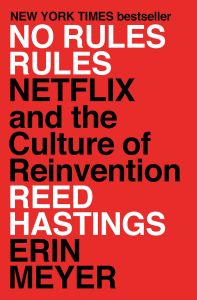
No Rules Rules: Netflix and the Culture of Reinvention
There has never before been a company like Netflix. It has led nothing short of a revolution in the entertainment industries, generating billions of dollars in annual revenue while capturing the imaginations of hundreds of millions of people in over 190 countries. But to reach these great heights, Netflix, which launched in 1998 as an online DVD rental service, has had to reinvent itself over and over again. This type of unprecedented flexibility would have been impossible without the counterintuitive and radical management principles that cofounder Reed Hastings established from the very beginning. Hastings rejected the conventional wisdom under which other companies operate and defied tradition to instead build a culture focused on freedom and responsibility, one that has allowed Netflix to adapt and innovate as the needs of its members and the world have simultaneously transformed.
Hastings set new standards, valuing people over process, emphasizing innovation over efficiency, and giving employees context, not controls. At Netflix, there are no vacation or expense policies. At Netflix, adequate performance gets a generous severance, and hard work is irrelevant. At Netflix, you don’t try to please your boss, you give candid feedback instead. At Netflix, employees don’t need approval, and the company pays top of market. When Hastings and his team first devised these unorthodox principles, the implications were unknown and untested. But in just a short period, their methods led to unparalleled speed and boldness, as Netflix quickly became one of the most loved brands in the world.
Here for the first time, Hastings and Erin Meyer, bestselling author of The Culture Map and one of the world’s most influential business thinkers, dive deep into the controversial ideologies at the heart of the Netflix psyche, which have generated results that are the envy of the business world. Drawing on hundreds of interviews with current and past Netflix employees from around the globe and never-before-told stories of trial and error from Hastings’s own career, No Rules Rules is the fascinating and untold account of the philosophy behind one of the world’s most innovative, imaginative, and successful companies.
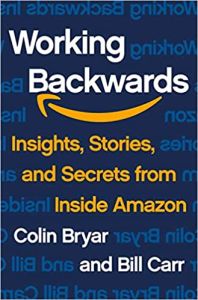
Working Backwards: Insights, Stories, and Secrets from Inside Amazon
In Working Backwards, two long-serving Amazon executives reveal the principles and practices that have driven the success of one of the most extraordinary companies the world has ever known. With twenty-seven years of Amazon experience between them―much of it during the period of unmatched innovation that created products and services including Kindle, Amazon Prime, Amazon Studios, and Amazon Web Services―Bryar and Carr offer unprecedented access to the Amazon way as it was developed and proven to be repeatable, scalable, and adaptable.
With keen analysis and practical steps for applying it at your own company―no matter the size―the authors illuminate how Amazon’s fourteen leadership principles inform decision-making at all levels of the company. With a focus on customer obsession, long-term thinking, eagerness to invent, and operational excellence, Amazon’s ground-level practices ensure these characteristics are translated into action and flow through all aspects of the business.
Working Backwards is both a practical guidebook and the story of how the company grew to become so successful. It is filled with the authors’ in-the-room recollections of what “Being Amazonian” is like and how their time at the company affected their personal and professional lives. They demonstrate that success on Amazon’s scale is not achieved by the genius of any single leader, but rather through commitment to and execution of a set of well-defined, rigorously-executed principles and practices―shared here for the very first time.
Whatever your talent, career or organization might be, find out how you can put Working Backwards to work for you.
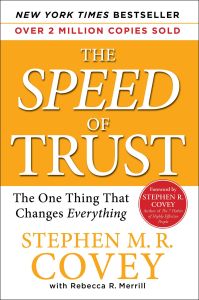
The Speed of Trust: The One Thing that Changes Everything
From Stephen R. Covey’s eldest son comes a revolutionary new path towards productivity and satisfaction. Trust, says Stephen M.R. Covey, is the very basis of the new global economy, and he shows how trust—and the speed at which it is established with clients, employees and constituents—is the essential ingredient for any high–performance, successful organization.
For business leaders and public figures in any arena, The Speed of Trust offers an unprecedented and eminently practical look at exactly how trust functions in our every transaction and relationship—from the most personal to the broadest, most indirect interaction—and how to establish trust immediately so that you and your organization can forego the time–killing, bureaucratic check–and–balance processes so often deployed in lieu of actual trust.